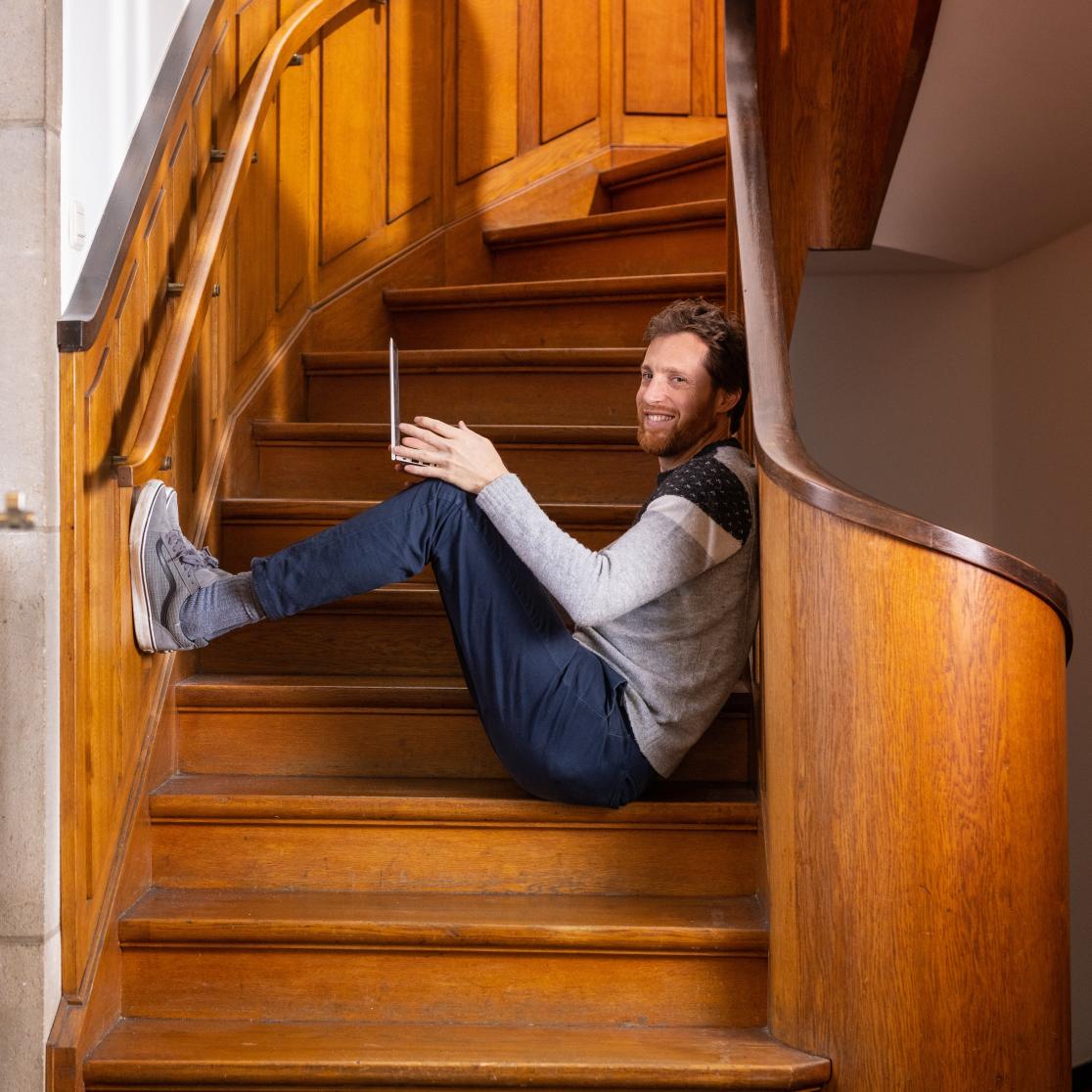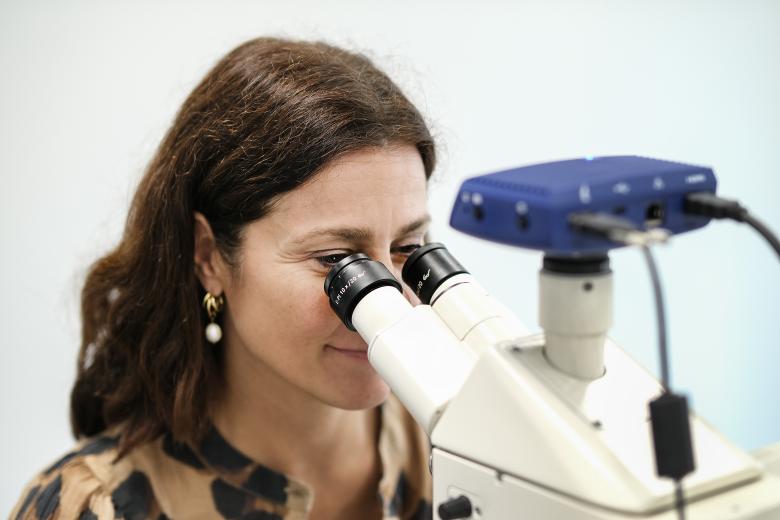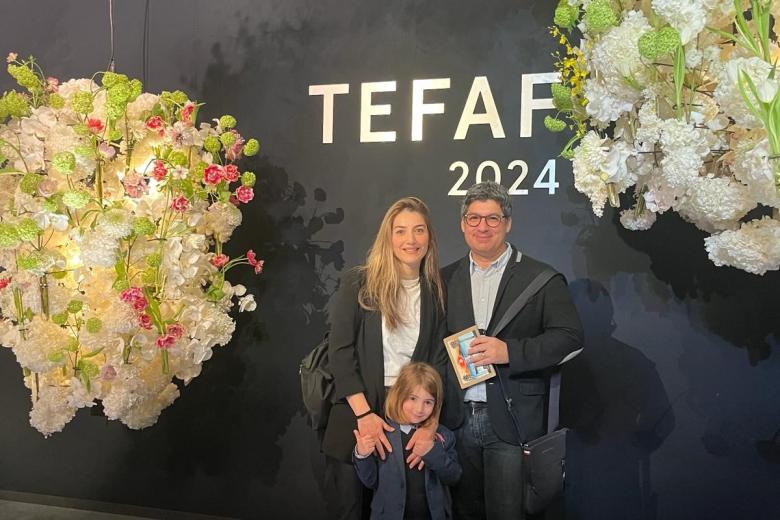“All my characters end up in the graveyard”
His second novel, The Invisibles, was recently published to high praise in the major Dutch newspapers. Author Frank Nellen is still floored by the response. Winning the Nederlandse Boekhandelsprijs 2024, a Dutch book award that is awarded by Dutch booksellers, was the cherry on top of the cake. It is a well-earned reward for four years of hard work—because the associate professor of Tax Law also conducts research, teaches at the Maastricht law faculty and works as a consultant for the accounting firm Baker Tilly.
In the staff room of the law faculty, Frank Nellen is congratulated by several colleagues. He accepts the compliments with a broad smile, and offers a signed copy of the book to the one colleague who hasn’t bought it yet. “Let me know what you think.”
For four years, he spent every free moment behind his laptop. “It took two years just to find a story that worked. We’re talking about hundreds of hours, in the mornings, evenings and weekends. I have notebooks full of half-formed outlines, ideas and thoughts. At some point all those blocks start to fall into place. That you can’t force the creative process is something I really struggle with sometimes. But once it clicks, whoosh, you soar. It’s incredible.”
Socialism better for the climate?
The book is set in the crumbling Soviet Union against the backdrop of the Chernobyl disaster. While researching the novel, Nellen became increasingly open to a socialist philosophy. Since his daughter Janna was born, he says he now thinks more about the future.
“The climate issue, inequality between rich and poor—that’s sure to go wrong at some point. We need to become less decadent and return to a more sustainable method of redistribution. Soviet-style communism is not the answer; that was a totalitarian and repressive system. But the thought I’m left with, after writing the book and having a child, is: would it be so bad if the economy were less efficient, if not everything was perfected to the last detail in the pursuit of profit? Wouldn’t an inefficient economy actually be better for the climate? A system that focuses less on increasing prosperity and more on moderation? If we had a faltering planned economy, the climate problem might not exist, obesity wouldn’t exist. Many of our problems would disappear. Wouldn’t that be better? Maybe there’d be no TV, but you’d just play cards together. And you’d have a nicer evening that way, with more social contact.”
For a tax specialist, he sings an unconventional tune. “I’ve always been the odd one out. Many of my colleagues—first at KPMG, now at Baker Tilly—love cars, but I’ve never been into that kind of thing. They all want a Tesla or a BMW; I prefer to take the train so I can work. Material things just aren’t important to me, even though my profession is all about money.”
Text continues below the photo.

Writer versus academic
Nellen’s interest in the tax profession took root slowly. It was only during his master’s in Tax Law, when he came to understand the underlying system, that he started to enjoy it. “The articles in a lawbook are formulated in a very difficult way, but once you master that idiom—which you can only do by reading very clearly and slowly—you begin to internalise the language. That’s when it all comes to life and you just fly through those laws. The moment I understood the system, acquired that knowledge and felt that my insight was increasing and improving, I started to get good marks. That’s when I discovered that the pleasure lies in improving yourself; in getting good at something, getting better at something. That was a revelation. For the first time, it gave me a sense of usefulness, of growth, of moving forwards in life.”
And yet, something was missing. “I enjoy my work, but it doesn’t grab me on a higher level. Ultimately, it always comes down to a euro more or less for the client or the government. You’re forever moving money and paper around. When I discovered reading and writing, I found something my work had been lacking: the human dimension. The personal, the human—I find that in literature and writing.”
“The personal, the human—I find that in literature and writing.”
Frank NellenThe dark side of humanity
Nellen grew up in Roosendaal as the second of four boys. He was a difficult teenager, he says. “I was very inward looking, with few interests and a dark view of humanity. I hated the first four years of high school: the chaotic relationships, the harshness, the bullying; it was a real bullfight, everybody at each other’s throats. I just didn’t like life that much. That changed in Year 11, when I started to develop real friendships. I changed as a person, life became more fun.”
He is still attracted to the dark side of humanity. “I’m fascinated by it. I gravitate towards writers like Cormac McCarthy, or books like The Painted Bird by Jerzy Kosiński—incredibly dark literature, I love it. I think it’s in line with my character. I know exactly what my weaknesses are: I have a short temper and I’m quick to think the worst of people. I also have a cheerful, high-spirited side, but it’s the dark side that comes out in my literary work. In the end, including in my first novel, almost everybody dies,” he laughs. “All my characters end up in the graveyard.”
First literary steps
It was his father who first encouraged him to write. The Nellens were a warm family, but his parents had an ascetic lifestyle: hard work, no alcohol, holidays in Zeeland at his grandparents’ house, and strict rules: no TV and no computer games during the week; activities his father considered ‘low grade.’ “When my father found me at the computer yet again, he yelled, ‘Go do something useful, write for the school newspaper.’ ‘What good will that do?’ I said. ‘I’ll give you 10 guilders for every page you write.’ Well, I went wild: six pages, three stories.”
He began to write in earnest when he was 27 and stuck in bed with torn cruciate ligaments. His younger brother Geert, who had got him reading literature a few years earlier, suggested he start writing stories himself. “He sent me an overview of short-story competitions. I typed up a story in bed and submitted it for the Helmond story prize. I didn’t win, but I made it into the top 10, and they made an anthology of those. An anthology with my story in it! A bad story, incidentally ... Anyway, I took this as encouragement, and entered all kinds of story competitions, with increasing success. So my tip for aspiring writers is: read a lot and start with short stories. Send them to story competitions and literary magazines.”

Hard work
He only found the time to work on a longer piece, a novel, after his PhD. What the writer and the academic Nellen share is the ability to work hard. “If I really want something and I sink my teeth into it, as with my PhD, I’d rather die than give up—that’s my strength. For the first two years, my book was appalling; hell, because you just don’t have the story yet. But you have to keep on plugging away, day after day. That’s who I am as an academic and as a writer. My father worked as a researcher at the Huijgens Institute in The Hague. He’d leave at six in the morning and come back at seven in the evening. When I think of him, I mainly think of hard work. He set an example that still has a big influence on me. I’m not a high flyer, but I can work seriously hard.”
Text: Annelotte Huiskes
Photography: Philip Driessen
“I’m not a high flyer, but I can work seriously hard.”
Frank NellenAlso read
-
SBE researchers involved in NWO research on the role of the pension sector in the sustainability transition
SBE professors Lisa Brüggen and Rob Bauer are part of a national, NWO-funded initiative exploring how Dutch pension funds can accelerate the transition to a sustainable society. The €750,000 project aims to align pension investments with participants’ sustainability preferences and practical legal...

-
Fresh air
Newly appointed professor Judith Sluimer (CARIM) talks about oxygen in heart functioning and the 'fresh air' the academic world needs.

-
Özge Gökdemir and Devrim Dumludağ reveal differences in competitive behaviour between women in the Netherlands
Economists and spouses Dr Özge Gökdemir and Professor Devrim Dumludağ conducted a study for Maastricht University that reveals differences in competitive behaviour between women in the Netherlands. Their findings will be published soon in a scholarly journal. Here, they give us a sneak peek.
